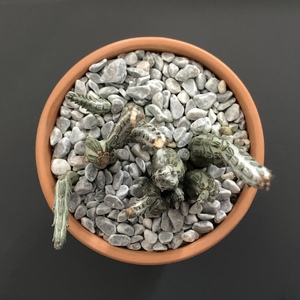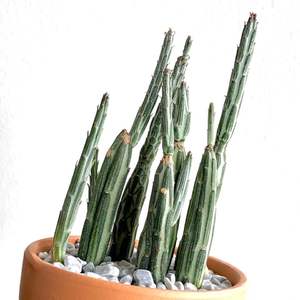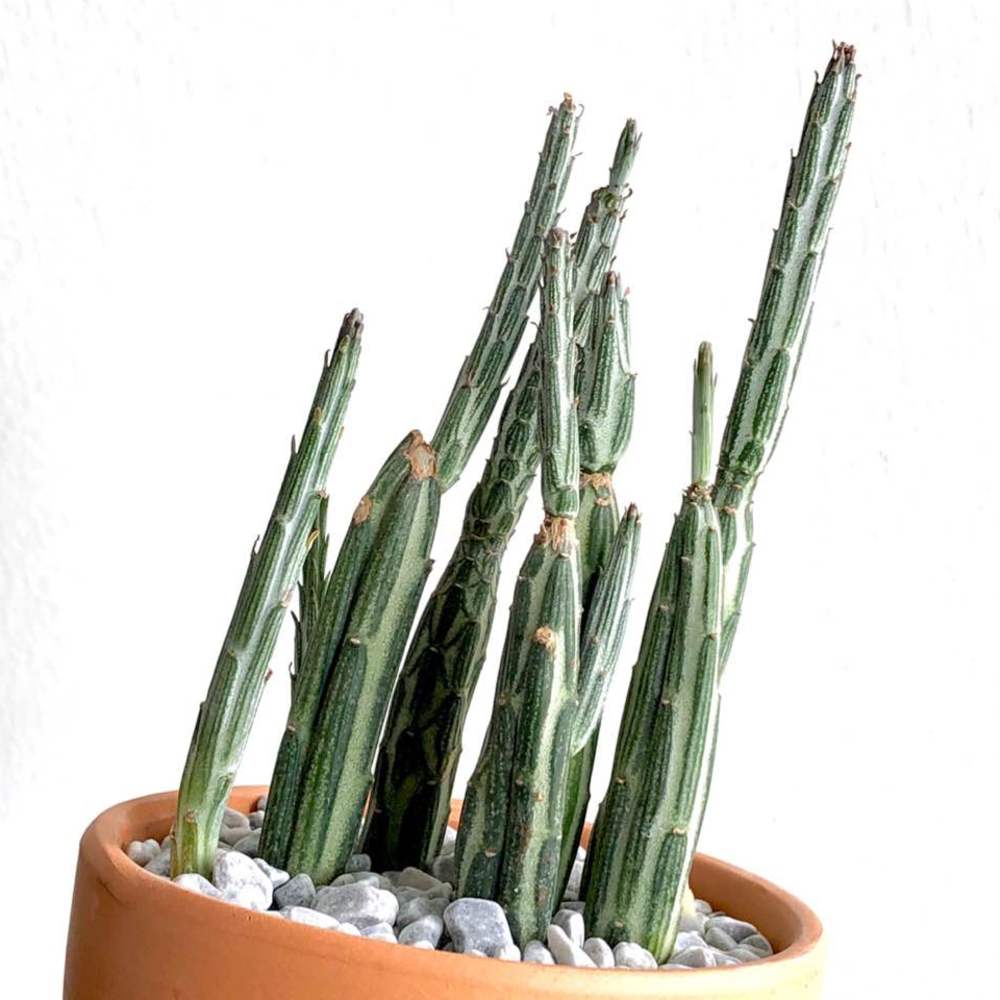植物经验
详细说明
Kleinia stapeliiformis is an attractive succulent plant with prettily marked pencil-like stems with purple-green patterns and soft spines along the sides. The stems are cylindrical, soft, brittle, glabrous and highly succulent, jointed, up to 10 inches (25 cm) long, up to 0.8 inch (2 cm) thick, with 4-6 or rarely more angles or grooves with scale-leaves arranged along the ribs, dark green and often with an unusual pinkish tinge with silvery-green striations and purple arrowhead markings below each node. Flowers are large, hawkweed-like and red or orange in color.
How to Grow and Care
Established plants are extremely drought tolerant. They do need some water, during the summer, but do not leave the soil wet for prolonged periods. Allow the soil to dry out between waterings in the winter, when they are somewhat dormant. Since they are growing in sandy soil, nutrients will need to be replenished. Fertilize annually, but lightly. Too much fertilizer will cause a lot of leggy growth.
Taller varieties can get floppy. You can prune them back to where the stem is firm, in very early spring. You can even root the cuttings.
Plants can be divided or repotted in early spring. If you are growing them in containers, they enjoy spending the summer outdoors. Wait until there is no danger of frost and move them back indoors in the fall.
Senecio can be grown from either seed or cuttings. Seeds prefer warm temperatures (55˚F / 13˚C). And constant moisture to germinate. Cuttings are easier and faster. Cut during the growing season, early spring to fall. Root in sandy soil, in containers.
Growing Conditions
Cold Hardiness: Most fall somewhere around USDA Hardiness Zones 9 – 11. A few can tolerate brief periods of cold or dampness, but prolonged exposure will turn them to mush.
Soil: Senecio doesn’t seem to be particular about soil pH. Something in the neural range (6.0 – 7.0) would be fine. More importantly, make sure the soil is on the sandy side and well-draining soil. Plants will rot if left damp.
Propagating
Senecio can be grown from either seed or cuttings. Seeds prefer warm temperatures (55˚F / 13˚C). And constant moisture to germinate. Cuttings are easier and faster. Cut during the growing season, early spring to fall. Root in sandy soil, in containers.
How to Grow and Care
Established plants are extremely drought tolerant. They do need some water, during the summer, but do not leave the soil wet for prolonged periods. Allow the soil to dry out between waterings in the winter, when they are somewhat dormant. Since they are growing in sandy soil, nutrients will need to be replenished. Fertilize annually, but lightly. Too much fertilizer will cause a lot of leggy growth.
Taller varieties can get floppy. You can prune them back to where the stem is firm, in very early spring. You can even root the cuttings.
Plants can be divided or repotted in early spring. If you are growing them in containers, they enjoy spending the summer outdoors. Wait until there is no danger of frost and move them back indoors in the fall.
Senecio can be grown from either seed or cuttings. Seeds prefer warm temperatures (55˚F / 13˚C). And constant moisture to germinate. Cuttings are easier and faster. Cut during the growing season, early spring to fall. Root in sandy soil, in containers.
Growing Conditions
Cold Hardiness: Most fall somewhere around USDA Hardiness Zones 9 – 11. A few can tolerate brief periods of cold or dampness, but prolonged exposure will turn them to mush.
Soil: Senecio doesn’t seem to be particular about soil pH. Something in the neural range (6.0 – 7.0) would be fine. More importantly, make sure the soil is on the sandy side and well-draining soil. Plants will rot if left damp.
Propagating
Senecio can be grown from either seed or cuttings. Seeds prefer warm temperatures (55˚F / 13˚C). And constant moisture to germinate. Cuttings are easier and faster. Cut during the growing season, early spring to fall. Root in sandy soil, in containers.
花相册 (2)


kensong
2018年10月05日

This is my first growing diary. Shared pot with Celine. RM75.00









